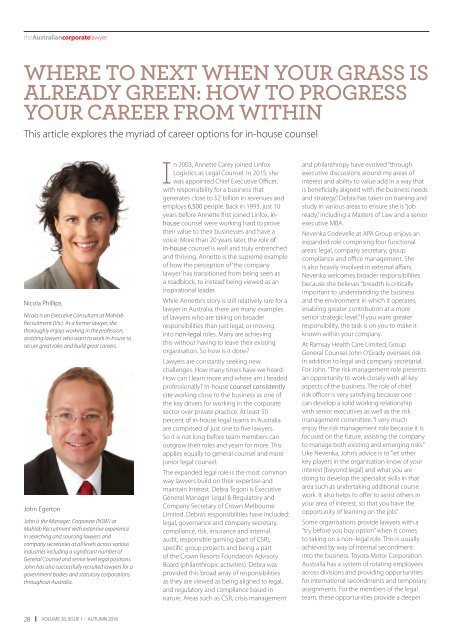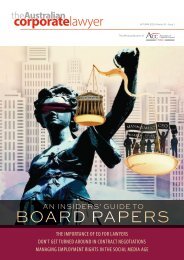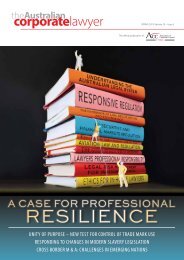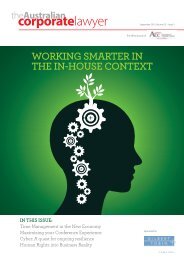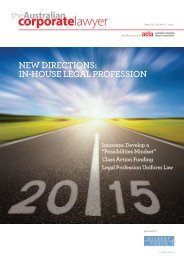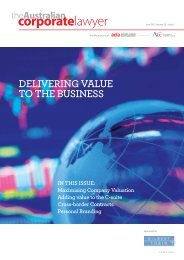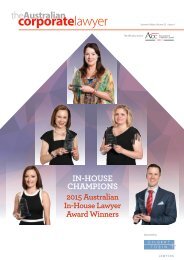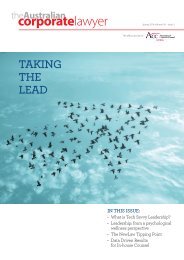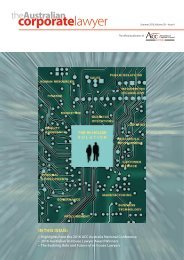Australian Corporate Lawyer - Autumn 2016
Australian Corporate Lawyer is the official publication of the Association of Corporate Counsel (ACC) Australia. The Autumn 2016 issue focuses on 'Advancing your in-House Career' and features a range of articles covering topics including: managing stress; trade marks and domain names; career motivated misconduct and cultural diversity.
Australian Corporate Lawyer is the official publication of the Association of Corporate Counsel (ACC) Australia. The Autumn 2016 issue focuses on 'Advancing your in-House Career' and features a range of articles covering topics including: managing stress; trade marks and domain names; career motivated misconduct and cultural diversity.
You also want an ePaper? Increase the reach of your titles
YUMPU automatically turns print PDFs into web optimized ePapers that Google loves.
the<strong>Australian</strong>corporatelawyer<br />
WHERE TO NEXT WHEN YOUR GRASS IS<br />
ALREADY GREEN: HOW TO PROGRESS<br />
YOUR CAREER FROM WITHIN<br />
This article explores the myriad of career options for in-house counsel<br />
Nicola Phillips<br />
Nicola is an Executive Consultant at Mahlab<br />
Recruitment (Vic). As a former lawyer, she<br />
thoroughly enjoys working in the profession,<br />
assisting lawyers who want to work in-house to<br />
secure great roles and build great careers.<br />
John Egerton<br />
John is the Manager, <strong>Corporate</strong> (NSW) at<br />
Mahlab Recruitment with extensive experience<br />
in searching and sourcing lawyers and<br />
company secretaries at all levels across various<br />
industries including a significant number of<br />
General Counsel and senior level legal positions.<br />
John has also successfully recruited lawyers for a<br />
government bodies and statutory corporations<br />
throughout Australia.<br />
In 2003, Annette Carey joined Linfox<br />
Logistics as Legal Counsel. In 2015, she<br />
was appointed Chief Executive Officer,<br />
with responsibility for a business that<br />
generates close to $2 billion in revenues and<br />
employs 6,500 people. Back in 1993, just 10<br />
years before Annette first joined Linfox, inhouse<br />
counsel were working hard to prove<br />
their value to their businesses and have a<br />
voice. More than 20 years later, the role of<br />
in-house counsel is well and truly entrenched<br />
and thriving. Annette is the supreme example<br />
of how the perception of ‘the company<br />
lawyer’ has transitioned from being seen as<br />
a roadblock, to instead being viewed as an<br />
inspirational leader.<br />
While Annette’s story is still relatively rare for a<br />
lawyer in Australia, there are many examples<br />
of lawyers who are taking on broader<br />
responsibilities than just legal, or moving<br />
into non-legal roles. Many are achieving<br />
this without having to leave their existing<br />
organisation. So how is it done?<br />
<strong>Lawyer</strong>s are constantly seeking new<br />
challenges. How many times have we heard:<br />
How can I learn more and where am I headed<br />
professionally? In-house counsel consistently<br />
cite working close to the business as one of<br />
the key drivers for working in the corporate<br />
sector over private practice. At least 50<br />
percent of in-house legal teams in Australia<br />
are comprised of just one to five lawyers.<br />
So it is not long before team members can<br />
outgrow their roles and yearn for more. This<br />
applies equally to general counsel and more<br />
junior legal counsel.<br />
The expanded legal role is the most common<br />
way lawyers build on their expertise and<br />
maintain interest. Debra Tegoni is Executive<br />
General Manager Legal & Regulatory and<br />
Company Secretary of Crown Melbourne<br />
Limited. Debra’s responsibilities have included:<br />
legal, governance and company secretary,<br />
compliance, risk, insurance and internal<br />
audit, responsible gaming (part of CSR),<br />
specific group projects and being a part<br />
of the Crown Resorts Foundation Advisory<br />
Board (philanthropic activities). Debra was<br />
provided this broad array of responsibilities<br />
as they are viewed as being aligned to legal,<br />
and regulatory and compliance based in<br />
nature. Areas such as CSR, crisis management<br />
and philanthropy have evolved “through<br />
executive discussions around my areas of<br />
interest and ability to value add in a way that<br />
is beneficially aligned with the business needs<br />
and strategy.” Debra has taken on training and<br />
study in various areas to ensure she is “job<br />
ready,” including a Masters of Law and a senior<br />
executive MBA.<br />
Nevenka Codevelle at APA Group enjoys an<br />
expanded role comprising four functional<br />
areas: legal, company secretary, group<br />
compliance and office management. She<br />
is also heavily involved in external affairs.<br />
Nevenka welcomes broader responsibilities<br />
because she believes “breadth is critically<br />
important to understanding the business<br />
and the environment in which it operates,<br />
enabling greater contribution at a more<br />
senior strategic level.” If you want greater<br />
responsibility, the task is on you to make it<br />
known within your company.<br />
At Ramsay Health Care Limited, Group<br />
General Counsel John O’Grady oversees risk<br />
in addition to legal and company secretarial.<br />
For John, “The risk management role presents<br />
an opportunity to work closely with all key<br />
aspects of the business. The role of chief<br />
risk officer is very satisfying because one<br />
can develop a solid working relationship<br />
with senior executives as well as the risk<br />
management committee. “I very much<br />
enjoy the risk management role because it is<br />
focused on the future, assisting the company<br />
to manage both existing and emerging risks.”<br />
Like Nevenka, John’s advice is to “let other<br />
key players in the organisation know of your<br />
interest [beyond legal] and what you are<br />
doing to develop the specialist skills in that<br />
area such as undertaking additional course<br />
work. It also helps to offer to assist others in<br />
your area of interest, so that you have the<br />
opportunity of learning on the job.”<br />
Some organisations provide lawyers with a<br />
“try before you buy option” when it comes<br />
to taking on a non–legal role. This is usually<br />
achieved by way of internal secondment<br />
into the business. Toyota Motor Corporation<br />
Australia has a system of rotating employees<br />
across divisions and providing opportunities<br />
for international secondments and temporary<br />
assignments. For the members of the legal<br />
team, these opportunities provide a deeper<br />
28 VOLUME 26, ISSUE 1 – AUTUMN <strong>2016</strong>


